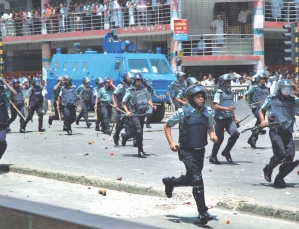| Home - Back Issues - The Team - Contact Us |
 |
| Volume 11 |Issue 24| June 15, 2012 | |
|
|
Letters Friend or Foe The article published in the Star last Friday highlights a matter of great urgency for the entire nation. The police, who should be the protectors of the law and order, have turned into law breakers. They are certainly misusing the power bestowed upon them by the constitution. They don't even hesitate to use their batons on politicians, journalists, and teachers. Recently, the beating of journalists and the incident near Dhaka Metropolitan Court have again brought their actions to the limelight. They should at least have the psychological training to know that a burglar and a civilian are different. Nowadays people are afraid of dealing with the police, lest they be harassed in some way or the other. Their activities prove that they are foes rather than friends. The government should take the matter into consideration before it creates massive disorder in the country. Sajib Dey Rights and Retributions
Interestingly, the very day the article, 'Ensuring a Mother's Rights', was published in the Star, I was engaged in a controversial discussion on the Islamic perspective on birth control. Beyond the commendable presentation of statistics and the case study, what attracted me most about the article was the writer's astute observation that religious and social context have the most influence on the decision-makers of the family. I found the White Ribbon Alliance's efforts of working with religious leaders insightful and creative. However, perhaps the basic problem is not their lack of understanding of the processes involved with safe birth, but rather their understanding of the religion itself. According to many renowned Islamic scholars, some forms of birth control are permissible in Islam and these are, in fact, the most commonly used methods i.e. the condom, Copper T etc. If the mother's health is at risk, even abortion is permitted. I applaud WRA's efforts to target imams to stir social change by promoting safe delivery, family planning etc. I am, however, sceptical of whether the imams will be receptive to new ideas if they are convinced that they are not in accordance to Islamic values. Syeda Shagufe Hossain In the Land of Hirak Raja Many thanks to the writer for presenting such an insightful postscript. I wonder if the people to whom the write-up is directed towards will ever understand the ramification of their actions – if they will ever go through a process of self-realisation and rectify their ways. But chances are there that they will remain the same and continue to harass ordinary people, as they are the kings and queens of this impoverished country. For a couple of days, I was frustrated at the thought of the numerous questionable activities being carried out by the incumbent government without anyone pointing a finger at them. But when I read the postscript, I felt quite at ease. The writer projected a series of chilling activities and sarcastic and shameless comments made by the government in a vivid and engaging manner. It is only because of the media that the general public gets to know about all these activities. The people are really passing through a bewildering and unpredictable time in the land of Hirak Raja. Mashudul Haque Dangerous Drugs
The cover story, 'Chasing the Dragon', published on 1st June represents the dreadful condition of illegal drugs trade in Bangladesh. We are worried that nowadays hundreds of thousands of Bangladeshi youths are taking drugs on a large scale. Indeed, the increasing demand for these drugs makes Bangladesh a hot destination for exotic drugs. I was flabbergasted when I heard that there were only 300 field personnel of the Department of Narcotics Control working to keep this massive illegal drug trade in check! It is unfortunate that our law enforcement agencies have failed to control the use of narcotics. Another concern is that there is no specific government data on the number of drug addicts or drug use in the country. The unchecked trafficking, sale and use of drugs are destroying the morality and health of our young people, destabilising the social order and causing economic losses. In the near future, Bangladesh will face a catastrophe if drug trade is not effectively checked. Stern measures should be taken to stop the trafficking, sale and use of drugs in the country and we have to build a social resistance against its use. Above all, a strong public movement against drug abuse should be launched nationwide. Mohammad Rahat Bin Kutub *** It is highly surprising that drugs are being supplied so easily throughout the country. Our neighbouring drug producing countries have no hesitation in choosing Bangladesh for their business and transit spot. The youth, who are supposed to be the driving power of the nation, are affected the most by drug abuse, although people of all ages engage in it. It is high time that we do something to prevent it. Every parent should be conscious about the activities of his/her children. Meanwhile, the administration should take steps to make our border force stronger and more reliable, so as to make it difficult for smugglers to carry out their business in Bangladesh. Only then can we save our teenagers from this darkness and can dream of a drug free society. Shakir Yesir
Copyright (R) thedailystar.net 2012 |
|||||||||

